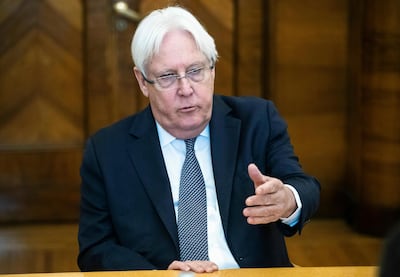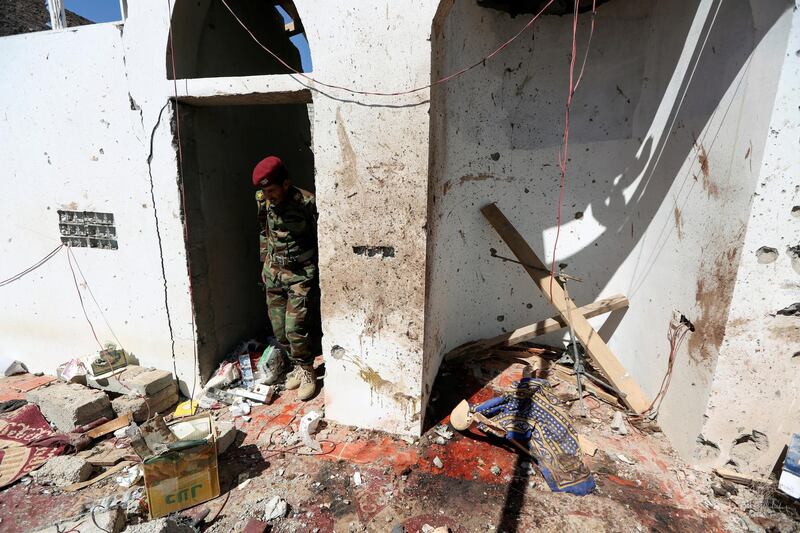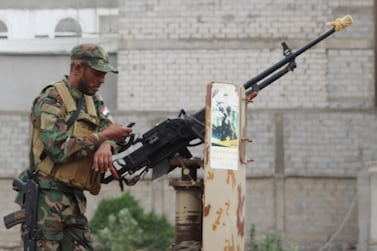An outbreak of heavy fighting in northern Yemen over the past two weeks threatens to unravel months of work to build a peace process and end the five-year conflict, United Nations envoy Martin Griffiths said on Tuesday.
Speaking to The National, Mr Griffiths said that months of careful mediation to build confidence between the government and the Houthi rebels could be "derailed" due to a new offensive in the north that has shattered months of relative calm.
“It only takes a few days of violence to undermine all this hard-earned progress and derail the entire peace process,” Mr Griffiths warned as he called for de-escalation.
The Iran-backed Houthis have launched a major push to recapture the country’s northern Al Jawf province and Marib governorate as well as Nehm, a half-hour drive from the rebel-held capital, Sanaa.

After a blitzkrieg offensive that pushed pro-government forces back around the two provinces, a counter-offensive led to loyalists regaining several strategic areas. A wave of more than 40 air strikes carried out by the Saudi-led Arab Coalition to support the government destroyed dozens of rebel tanks and armoured vehicles.
Residents trapped by the fighting said that intense bombardments prevented them fleeing.
In the relatively secure city of Taez, a Houthi mortar on Monday hit a market, killing one person and wounding 10 others. At least 13 fighters from both sides were killed in fighting in the central province of Bayda on Sunday.
In a statement released by US Secretary of State Mike Pompeo, he said the US was "alarmed" by renewed violence in the country.
"We call on all parties to put the needs of the Yemeni people first and immediately return to restraint. The Houthis must cease attacks on Saudi territory," it said.
“It is not too late to change course and defuse the situation now,” Mr Griffiths said. “I urge all parties to renew their commitment to a peaceful resolution to the conflict because the Yemeni people deserve better than a life of perpetual war.”
The UN envoy has been shuttling between Riyadh, where President Abdrabbuh Mansur Hadi and members of the internationally recognised government of Yemen are based, and Sanaa to meet the Houthis.
The UN Security Council is set to discuss the surge in violence at an emergency meeting called by the UK on Tuesday. UK envoy Karen Pierce said Mr Griffiths would address the council in a closed-door briefing.
Near the start of the recent fighting on January 19, two missiles hit a Yemeni-government training base in Marib, killing more than 130 soldiers. The government blamed the Houthis for the attack although the group has not claimed responsibility.
The fighting has shattered months of relative calm in the conflict that the UN says has caused the worst humanitarian crisis in the world.
At the start of January, Mr Griffiths told the UN Security Council that Yemen experienced one of the quietest weeks since the war began in 2015.
“With each positive step, we are brought closer to formally launching political consultations between the government of Yemen and the Houthis,” Mr Griffiths said at the time.
His comments came just two days before the attack on Marib.
Yemeni government officials agree with Mr Griffiths that the violence will have severe consequences for the country's political process.
The UN envoy helped broker a historic peace deal between Yemen's warring sides in Sweden in December 2018.
It was meant to be seen as the first step towards a wider negotiated settlement to the conflict. It averted the government offensive to capture the Red Sea city of Hodeidah by agreeing to a cessation of hostilities for the area and a withdrawal of all forces.
"The violence has heavily affected the Stockholm agreement. Initially, there was little confidence in its implementation because the deal was exploited by the rebels," Majid Fadhil, Yemen’s deputy human rights minister, said.
The Houthis benefited from the deal by "escalating violence around Hodeidah," Mr Fadhil said.
"More than one year has passed since the Stockholm agreement was reached, and nothing tangible was yielded other than giving the Houthis a lifesaving boat in Hodiedah," Marwan Ali Noman, Yemen's deputy permanent representative to the UN said.
"It also gave them the opportunity to reorganise and reopen other war fronts," Mr Noman said.
It comes as the UN's food agency said on Tuesday that one of its warehouses in the Houthi-held northern province of Hajja had been looted.
The World Food Program statement described the culprits as “militias” and said 127.5 tonnes (over 115,000 kilograms) of aid were stolen.







